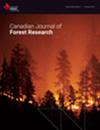桉树木材品质的基因型和环境互作为能源目的
IF 1.5
3区 农林科学
Q2 FORESTRY
引用次数: 0
摘要
本研究的目的是评价在巴西中西部3个地点种植的桉树无性系的木材化学和能量特性。为此,在不同地点种植了5个桉树无性系,旨在确定树木生长环境和遗传物质变化对木材质量特性的影响。在三个地点种植相同的无性系,以确定基因型与环境的相互作用。然后在种植5年后对树木进行物理化学和能量表征取样。结果表明,不同的无性系,木材特性的变化比例不同,正如树木的生长环境会改变无性系对相同特性的行为。土壤变量影响木材特性,推断土壤含水量对木材特性的影响大于空气含水量,主要是对木材基本密度的影响。本研究结果表明,木材的特性受气候变量的强烈影响,因此使用与环境条件相关的适当基因型决定了木材的特性。本文章由计算机程序翻译,如有差异,请以英文原文为准。
GENOTYPE AND ENVIRONMENTAL INTERACTION ON THE WOOD QUALITY OF <i>Eucalyptus</i> spp. FOR ENERGY PURPOSES
The objective of this study was to evaluate the wood chemical and energetic characteristics of Eucalyptus spp. clones planted in three sites in the Midwest of Brazil. Thus, five clones from Eucalyptus spp. were planted in different sites aiming to determine the qualitative characteristics of the wood resulting from the variation in the tree growth environment and the genetic material. The same clones was planted in the three sites to determine the genotype x environment interaction. The trees were then sampled at five years after planting for their physical-chemical and energetic characterization. The results showed that the wood characteristics vary in different proportions according to the clone, just as the growth environment of the trees alters the behavior of the clones for the same characteristics. The edaphic variables affected the wood characteristics, inferring that the water content in the soil has more effect on the wood properties than the water content in the air, mainly on wood basic density. The results of this study indicate that using the appropriate genotype related to the environment conditions determines the wood characteristics, since the wood properties are strongly influenced by the edaphoclimatic variables.
求助全文
通过发布文献求助,成功后即可免费获取论文全文。
去求助
来源期刊
CiteScore
4.20
自引率
9.10%
发文量
109
审稿时长
3 months
期刊介绍:
Published since 1971, the Canadian Journal of Forest Research is a monthly journal that features articles, reviews, notes and concept papers on a broad spectrum of forest sciences, including biometrics, conservation, disturbances, ecology, economics, entomology, genetics, hydrology, management, nutrient cycling, pathology, physiology, remote sensing, silviculture, social sciences, soils, stand dynamics, and wood science, all in relation to the understanding or management of ecosystem services. It also publishes special issues dedicated to a topic of current interest.

 求助内容:
求助内容: 应助结果提醒方式:
应助结果提醒方式:


